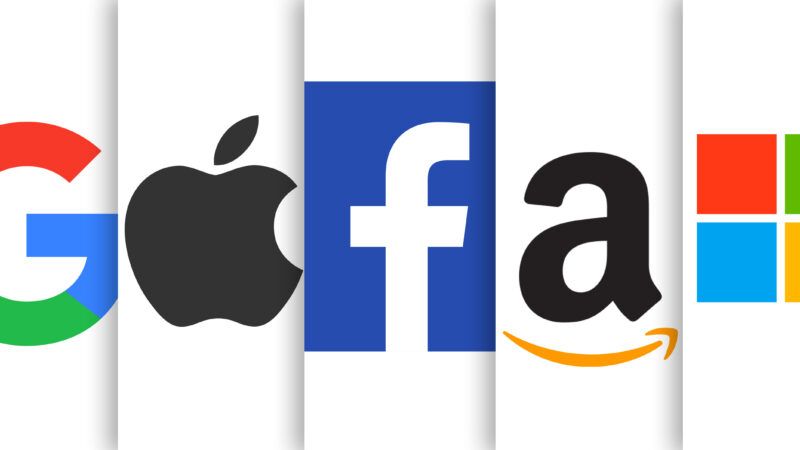Today's Tech Giants Show That Market Dominance Is Transitory
Market forces have historically disrupted the tech sector and will continue to do so.

Continuing the trend from 2022, Big Tech has begun 2023 by downsizing. Google on Friday and Spotify on Monday announced plans to lay off about 12,000 and 600 employees, respectively, totaling roughly 6 percent of each company's workforce. Last week, Microsoft announced 10,000 layoffs, a reduction of less than 5 percent. These companies join a procession of tech companies shedding workers: Facebook's parent company, Meta, shed 13 percent of its staff—roughly 11,000 employees—last fall, and Amazon is in the midst of terminating more than 18,000 positions.
These woes transcend layoffs: Tech stock prices have withered as well. In the 12 months preceding Tuesday morning, Google parent Alphabet's stock is down 25 percent, Amazon's 31 percent, Meta's 53 percent, and Microsoft's 16 percent. What's more, Meta's (Facebook's parent company) quarterly revenues are shrinking, as are Google's, YouTube's, and Microsoft's. TikTok is on pace to eclipse the aging Facebook's user count in 2026.
Big Tech's faltering suggests that, despite the stump speeches of such would-be super-regulators like Sen. Amy Klobuchar (D–Minn.), today's incumbents do not possess unlimited control over their markets and are subject to economic forces like all other businesses. This comports with the economic and historical records, which show that fortunes of businesses, even dominant businesses, wax and wane.
In his economic primer, Basic Economics, Thomas Sowell recounted at length the rising and falling of once-dominant businesses across many industries. He further posited that true monopolies are exceedingly rare—sans regulatory protection of industry, that is.
"In just one year—between 2010 and 2011—26 businesses dropped off the list of the Fortune 500 largest companies, including Radio Shack and Levi Struass," Sowell wrote. "Such processes of change have been going on for centuries and include changes in whole financial centers. From the 1780s to the 1830s, the financial center of the United States was Chestnut Street in Philadelphia but, for more than a century and a half since then, New York's Wall Street replaced Chestnut Street as the leading financial center in America, and later replaced the City of London as the financial center of the world."
Indeed, the American tech sector has historically seen similar disturbances as well as similar panics over incumbents alleged monopolization. For instance, in 1998, the year Google was founded, Fortune proclaimed Yahoo the victor of "the search-engine wars." The article is littered with once-prominent tech companies that are now largely forgotten, including CDNow, Excite, Lycos, and Infoseek. To combat the supposed monopoly of AOL instant messenger, competitors lobbied the Federal Communications Commission (FCC) for protection, Wired reported in 2000. In the aughts, writers fretted that MySpace would forever maintain its "natural monopoly."
Companies fade for many reasons: Competition, innovation, economic downturns, leadership failures, etc. Tech columnist Christopher Mims last fall disputed the notion that high-profile tech executives are infallible, which he termed "the myth of extreme competence." As evidence, Mims pointed to the failures of crypto exchange FTX, Facebook's steady decline, and Elon Musk's chaotic management of Twitter.
"Indeed, the most obvious expression of this change in sentiment about America's biggest tech companies is that they have collectively lost more than $2 trillion in value on the stock market," argued Mims. "Compared with their peaks, this has wiped out more than half of the personal wealth of both Mr. Musk and Mr. Zuckerberg."
In a decade's time, the tech landscape will doubtless be disrupted, and the market shares of many of today's giants will have shrunk or disappeared. However, to justify their own technocratic aspirations, politicians in search of dragons must often settle to fight paper tigers. Said Sowell: "The rarity of genuine monopolies in the American economy has led to much legalistic creativity, in order to define various companies as monopolistic or as potential or 'incipient' monopolies."


Show Comments (34)